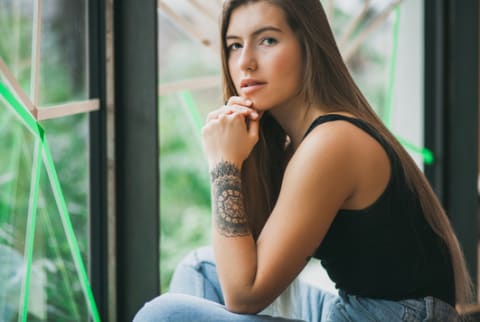Advertisement
What To Eat For Long, Luscious Hair


A lot of patients reach out to me to help find the root cause of their hair loss. Some of you may know about my personal struggle with thinning hair and how I overcame it through nutrition.
Taking supplements helps, but I encourage patients to get their nutrients through food first if they can, and ideally, it's better to know which specific nutrients they may be deficient in.
Nutrient deficiency testing can be done through a functional and integrative medicine doctor. Most often it's zinc, selenium, magnesium, B12, ferritin, or omega-3 fats. Correcting these deficiencies will definitely help improve hair quality including luster, shine, color, and growth.
When it comes to nutrition, I always encourage eating organic (when possible), non-GMO, preservative-free, chemical-free, and without high-fructose syrup, artificial sweeteners, and food coloring. Your diet is the first thing you can control.
These are the top five foods I recommend for patients to help improve their hair.
Protein
1. Eggs
With 6 grams of protein and 5 grams of healthy fats, including omega-3 fatty acids, for one serving, eggs are extremely nutritious for your hair.
They're also rich in vitamins like biotin, folic acid, B12, iron, and choline, all of which aid in hair quality by improving shine, premature graying, dullness, and thinning. Eggs also improve brain function and can naturally increase your good cholesterol (HDL), which is always a plus to keep in mind.
Try to buy free-range, organic eggs when you can since those are the best quality and most wholesome form. You want to eat eggs from chickens that were fed a diet rich in omega-3s so you get more of that in your eggs.
Healthy Fats
2. Avocado
This is a must at least a few times a week. Not only are you getting healthy monounsaturated fats, which improve shine and luster, but you also get plenty of fiber, potassium, oleic acid, and B vitamins.
Avocados work on a cellular level to improve hair growth, texture, and dullness—they're like a one-stop shop for all your hair ailments!
If you're feeling savvy, you can even make an avocado hair mask by mixing a soft mushy avocado with an omega-3 rich egg to make paste for your hair. You'll be left with shiny, lustrous, silky-smooth hair.
3. Salmon
Salmon is a staple in my diet, especially wild-caught Alaskan salmon. Salmon is safe to eat and is on the list of low-mercury fish, as long as it's good-quality salmon.
It's also high in omega-3 fatty acids, which improve hair follicles on a cellular level, which promotes hair growth. Try eating this twice a week for optimal results.
Minerals
4. Dark chocolate
Magnesium deficiency is actually fairly common, and I see it in clinical practice often when patients complain of cramping, headaches, insomnia, and even anxiety.
Dark chocolate is a must for people with magnesium deficiency, the symptoms of which include thinning hair, hair loss, increased split ends, and even dull hair. In fact, most people who crave chocolate actually don't realize they're lacking this vital mineral.
This happens when there is an imbalance between calcium and magnesium. If calcium intake is higher than magnesium intake, it can cause an insulin spike, making you crave sweet dark chocolate.
Make sure you buy a high-quality organic dark chocolate with 70 percent or more cocoa content, for anti-inflammatory benefits. A small amount is all you need to satisfy this craving.
5. Pumpkin seeds
Go nuts with these seeds. Pumpkin seeds—whole or shelled—are an excellent way to get your zinc intake for the day.
One serving (¼ cup) of pumpkin seeds has more than 2 grams of zinc. Pumpkin seeds are also rich in magnesium and alpha-linolenic acid (a vegan omega-3).
You can easily sprinkle them into oatmeal, salads, and smoothies for a subtle crunch. Taking a zinc supplement will help with thinning hair; however, it can actually make you nauseous, so that's why snacking on these seeds is a must!